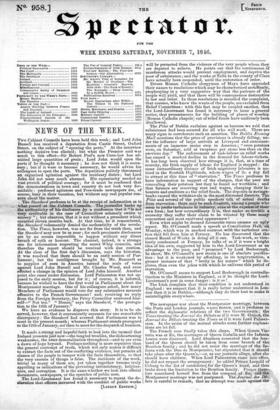It needs a strong and hopeful faith to look into
the turmoil that Ireland presents just now—the tangled troubles, the disheartening weaknesses, the utter demoralization throughout—and to see even a dawn of hope beyond. Perhaps nothing is more repulsive than the general contempt of truth, which only makes it difficult to extract the facts out of the conflicting evidence, but permits all classes of the people to tamper with the facts themselves, so that the very essence of things is false. The incidents of the week, trivial as many of them are, yet taken together become truly appalling as indications of the pervading inZonsistency, helpless- ness, and corruption. It is the same whether we look into official documents, newspapers, or the speeches of public men.
The Lord-Lieutenant has found it necessary to repeat the de- claration that officers intrusted with the conduct of public works [LATEST EDITION.] will be protected from the violence of the very people whom they are deputed to relieve. He points out that the continuance of murderous attacks would prevent employment, and deprive the poor of subsistence; and the works at Tulle in the county of Clare have actually been suspended, until the restoration of order.
Divers Roman Catholic clergymen of Mayo have appended their names to resolutions which may be characterized as ruffianlyr, prophesying in a very suggestive way that the patience of the people will yield, and that there will be consequences destructive to law and order. In these resolutions is recorded the complaint, that curates, who know the wants of the people, are excluded from Relief Committees : with this fact may be coupled another, that the Lord-Lieutenant has found it necessary to issue a general notice, that presentments for the building of places of worship [Roman Catholic chapels] out of relief funds have uniformly been disallowed.
The Pilot of Dublin exclaims against us because we said that subsistence had been secured for all who will work. There are many signs to corroborate such an assertion. The Dublin Evening Mail mentions that the price of provisions is already falling, tin- der the influence of large arrivals at Liverpool and announce:. ments of an immense maize crop in America ; "even potatoes were, on Saturday, sold at twopence per stone less than on the previous day." the enforcement of task-labour on relief works has caused a marked decline in the demand fur labour-tickets. It has long been observed how strange it is, that, at a time of scarcity, the Irish supply of labour for England is stopped : the same extraordinary absence of Irish migratory labourers is no- ticed in the Scottish Highlands, where wages of 2s. a day fail to attract at this time of " starvation." The Times professes to have information in support of the charges, that the poor are concealing their potatoes lest they be found not worthless ; . and that farmers are reserving rent and wages, charging their la- bourers and creditors on the relief funds. The deposits in savings- banks exceed the withdrawals in the most distressed districts. The Pilot and several of the public speakers talk of actual deaths from starvation : there may be such disasters, among a people who seem to prefer turbulence to industry, even at the expense of their own lives; but how extraordinary it is, that under so terrible a necessity they suffer their claim to be vitiated by these many concurrent and most equivocal appearances ! Even what might be deemed favourable turns assume an ugly aspect. Mr. O'Connell made a speech at Conciliation Hall, on Monday, which was in marked contrast with the turbulent ora- tion that fell from him at Fermoy. He has discovered that the abused Board of Works is doing all it can. Task-work, so viru- lently condemned at Fermoy, he talks of as if it were a bright idea of his own, suggested by him to the Lord-Lieutenant as an advantage to the poor, and " promised" by Lord Besborough. In short, Mr. O'Connell's new strain is one of absolute pacifica- tion : but it is weakened by affording, in its tergiversation, a grosser instance of that " levity in his nature" which he de- plores, than even the jokes with which he enlivens this period of starvation.
Mr. O'Connell seems to support Lord Besborough in contradis- tinction to the Ministers in England, as if he thought the Lord- Lieutenant's post in some danger : is it so ?
The Irish complain that their condition is not understood in England : we suspect that it is really better understood in Lon- don than it is in Dublin,—although they do their best to make it unintelligible everywhere.


























